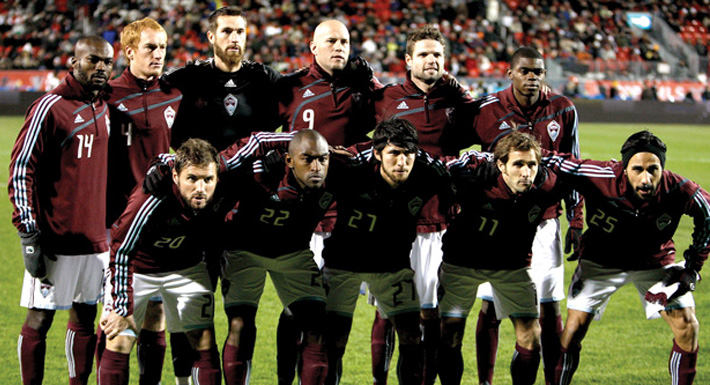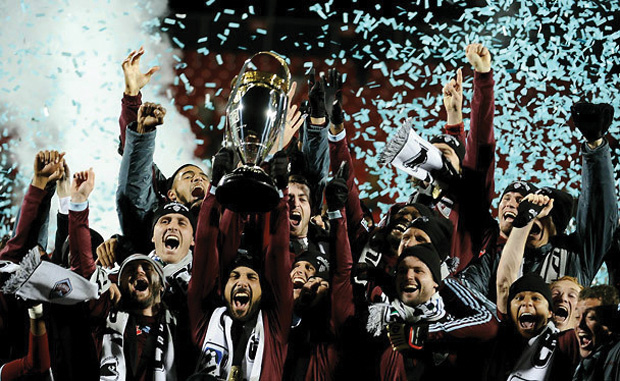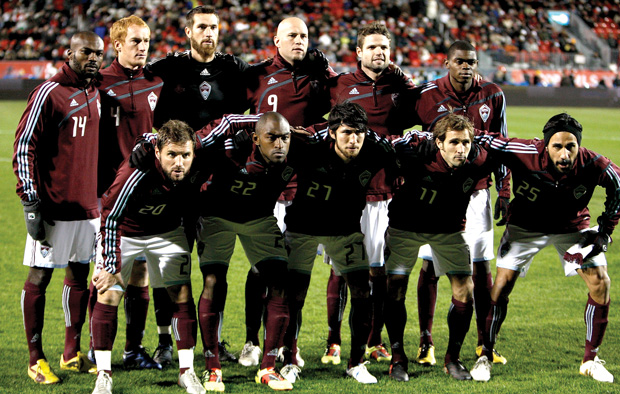Much has been made of Japanese sluggers infiltrating Major League Baseball, but with Japan’s growing soccer craze, baseball is no longer the only sport on the plate. As superstars like Suzuki Ichiro and Matsui Hideki once paved the way to baseball stardom, compatriot Kosuke Kimura is now singlehandedly blazing a trail into the United States’ Major League Soccer.
Having just celebrated a championship victory in Major League Soccer with the Colorado Rapids, Kosuke Kimura, the first Japanese-born player in the history of the US league, is off to a good start. At only age 26, though, Kimura doesn’t have any plans to stop there. When recently asked about his long-term goals over a cup of coffee in Tokyo, the Rapids defender, kitted out in a leather jacket and blue jeans, says matter-of-factly in a noticeably Americanized accent, “I want to play in the World Cup one day.”
While Kimura may not be a household name yet, he has recently garnered an upsurge of attention. Although positioned in the backfield, the Japanese native scored the goal in the semifinal match with the San Jose Earthquakes that took his team to the MLS Cup 2010.
“I can’t resist attacking when I see the opportunity, so that’s what I did,” he laughs. “But no one was complaining after that goal.”
The defender went on to play the entire duration of the final game against FC Dallas. After a tense, physical 90 minutes that ended with a one-all tie, plus a 30-minute overtime, the Rapids emerged victorious in the first MLS Cup in the team’s history when a shot by the Sengalese striker Macoumba Kandji was deflected off a FC Dallas defensive player into the goal.
“The problem in Japan is that there is too much emphasis on formula … (so) baseball is an ideal sport … But with soccer, relying on formulas doesn’t work”
The road to this point has been anything but straight for Kimura, though. In contrast to the spirit of his early training in Japan – which he describes as being “uptight” – the rising star has learned the importance of adapting both on and off the field.
Kimura’s desire to go pro started early, while watching J-League games on television. Although he grew to love the sport by watching Japanese players, with time and experience, he found flaws in Japan’s style of play that he felt would hold him back from the potential for wider exposure.
“Japanese soccer tends to be more about looking good, passing smoothly and so on,” Kimura says. “Every player is encouraged to follow the same training routines and to essentially become like everyone else. The same pattern shows up in many parts of Japanese society, such as in education.”
This perspective, combined with the fact that playing for a Japanese university team does not lead to the pros, inspired Kimura to set his sights abroad. Recognizing the challenges inherent in the European soccer machine, he looked to America’s more open and untapped soccer culture instead. In Europe, he realized, big name players are often snatched up during their teens by forward looking recruiters from high ranking teams.
“Beckham signed at age 14, and Messi was practically raised by Barcelona,” he cites as examples.
With salaries in the MLS on the rise and higher caliber players suiting up (Wayne Rooney’s younger brother John just signer up with the NY Red Bulls), Kimura is confident that soccer will continue to progress in the states. Even if he always has Europe and the ultimate dream of World Cup play buzzing in the back of his mind, he is quite content with letting things evolve right where he is now.
“The US has so much potential to develop,” he says. “Even FIFA considers it one of the fastest growing regions for the sport in the world.”
After assessing his options, Kimura decided to try and play at the college level in the states. Though his exemplary high school career was cut short by a broken foot, he compiled a video of his playing highlights and sent it to a slew of American Division I coaches. After getting a healthy number of replies, the best offer came in the form of an athletic scholarship to play for the Western Illinois University Leathernecks — if he could show the proper academic credentials in English to be accepted to the school first.
Even if it wasn’t as simple as boarding a plane and suiting up, but the cold weather was in his favor — academically at least: “When I arrived, the place was covered in snow,” he recalls of his introduction to Macomb, Illinois. “There was literally nothing to do but study.”
And study he did, with such intensity that he barely touched a soccer ball for six months. First in Kimura’s educational gauntlet was the American standardized test for university admissions, the SAT, for which he received a passable score by nearly acing the math section; for the English portion of the test, he simply filled in his name for 200 points and dozed through the rest.
“I studied the math section like crazy because I knew my English wasn’t good enough for me to stand a chance,” he laughs. “My strategy worked.”
But it would be impossible for him to escape learning English forever, and his biggest challenge was the year-long English language boot camp that he was forced to condense into six months.
“All I did was study every day, all day,” he recalls. “My teacher said that if I wanted to have a hope of passing, I had to literally cut all ties with Japanese classmates and do everything in English.”
The mental stress paid off by delivering him the athletic scholarship that he needed, and Kimura proceeded to help his team rocket from the bottom of the Division I into the national spotlight. For three years straight during his time with the Leathernecks, they made it to the first round of the national tournament, only narrowly losing to heavyweights like Northwestern and Notre Dame.
“We came out of nowhere,” Kimura says. “Even though we didn’t beat those teams, we literally went from being one of the lowest ranked teams in Division I to one of the highest. This caught peoples’ attention.”
Among those watching the Leathernecks’ miraculous string of seasons was the coaching staff of the Colorado Rapids, and in 2007, Kimura heard the news that he’d been drafted.
“My coach told me to have a look at a website, but gave no further explanation,” Kimura says. “When I checked it out later, I read that I’d been drafted by the Rapids in the preliminary round. I couldn’t believe it, but it was real.”
Once he hit his stride after a few quiet seasons, Kimura began to shine in his own unorthodox way. A midfielder at heart, the Japanese player says, “I always said I would strike if the chance came, and sure enough it did in the San Jose match.”
When reflecting on the major differences between the styles of play in the US and Japan, Kimura notes a couple things. First, he considers the training regimen in the US to be much more intense than its Japanese counterpart.
“Since coming to the US, I’ve gained 15 pounds from weight training,” he says. Alongside bulking up, Kimura says he spends four hours stretching seven days a week. “It’s all about stretching. It’s almost like a full-time job for me.”
But even more significant, he says, is the mindset. Where he was praised for going beyond the line of duty and scoring the goal that took the Rapids to the MLS Cup 2010, in Japan this kind of boundary breaking is looked down upon.
“The problem in Japan is that there is too much emphasis on formula,” Kimura says. “For this very reason, baseball is an ideal sport for Japan. It’s a bit more slow moving and works well with strategy; for example, throwing a certain kind of pitch against a certain kind of batter, and so on.”
“But with soccer,” he continues, “relying on formulas doesn’t work. It’s a contact sport and requires a very high degree of athleticism and individual strengths. For the level of play in Japan to improve, more players need to begin developing their own individual styles.” — (JONATHAN DeHART)
External Link:
Kosuke Kimura Home Page











